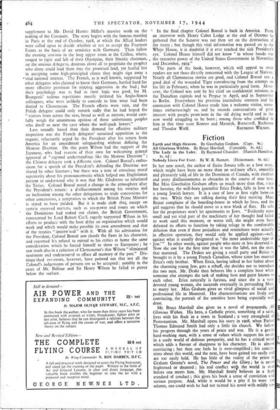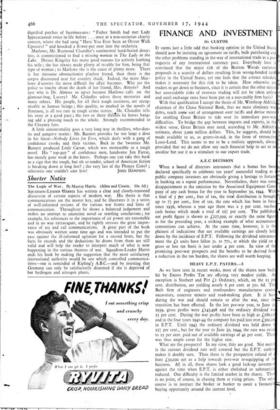Fiction
Earth and High Heaven. By Gwethalyn Graham. (Cape. 9s.) All Glorious Within. By Bruce Marshall. (Constable. 8s. 6d.) The Lady in the Lake. By Raymond Chandler. (Haznish Hamilton.
8s. 6d.) Nobody Lives For Ever. By W. R. Burnett. (Heinemann. 8s. 6d.) IN her new novel, the author of Swiss Sonata tells us a love story, which might have been no more than an ordinary affair, smoothly
and pleasantly told, of life in the Dominion of Canada, with rivalries and petty disillusionments as obstacles in the course of true love. But Miss Gwethalyn Graham offers us much more than that, since her heroine, the well-born journalist Erica Drake, falls in love with a young Jewish lawyer. It is a case of love at first sight between the two. While they are talking during their first meeting Marc Reiser complains of the boarding-house in which he lives, and the girl suggests that he should move to a new block of flats. He tells her the proprietors won't let apartments to Jews. "Evidently some small and yet vital part of the machinery of her thought had failed to work until this moment, or worse still, she might even have defeated its efforts to function by taking refuge in the comfortable delusion that even if these prejudices and restrictions were actually in effective operation, they would only be applied against—well, against what is usually designated as ' the more undesirable type of Jew." In other words, against people who more or less deserved it.
Now she saw for the first time that it was the label, not the man, that mattered. The Drakes are giving a small party and Reiser is brought to it by a young French Canadian, whose sister has married Erica's only brother. When Erica, having talked to her father about the charming young Jew, gets a rebuff, she decides not to introduce the two men. Mr. Drake then behaves like a complete boor when someone else attempts the task of making host and guest known to each other. Erica naturally is furious, and since she is a very devoted young woman, she succeeds eventually in persuading Marc to marry her. Miss Graham gives us vivid glimpses of social and professional life in Montreal. Her characterisations are lively and convincing, the portrait of the sensitive hero being especially well done.
Mr. Bruce Marshall also gives us a novel of propaganda, All Glorious Within. His hero, a Catholic priest, something of a saint,
lives with his flock in a town in Scotland ; a very stronghold of Protestantism. Mr. Marshall opens his story in 1908, when Father Thomas Edmund Smith had only a little tin church. We follow
his progress through the years of peace and war. He is a gentle hard-working man, with a sense of vallues which support his needs in a seedy world of dubious prosperity, and he has a critical mind which adds a flavour of sharpness to his character. He is almost convincing ; but then one feels he is over-simplified ; his conclu-
sions about this world, and the next, have been gained too easily and are too easily held. He has little of the reality of the priest in
Graham Greene's novel, The Power and the Glory ; he is never frightened or daunted ; his real conflict will the world is over before one meets him. Mr. Marshall firmly believes in a high standard of conduct; this gives his book a sense of conviction and serious purpose. And, while it would be a pity if he were too solemn, one could wish he had not tainted his novel with mildly un-
dignified patches of facetiousaess: " Father Smith had met •Lady Ippecacuanah twice in-life before .. . once at a non-sectarian charity concert, where she had sung " Have You Ever Seen an Oyster Walk Upstairs? " and knocked a flower-pot over into the orchestra. Marlowe, Mr. Raymond Chandler's sentimental hard-boiled detec- tive, is commissioned to find a missing woman in The Lady in the Lake. Derace Kingsley has many good reasons for actively loathing his wife ; she has always made plenty of trouble for him, being that type of woman ; to Marlowe she is the cause of plenty more. There is her tiresome obstructionist playboy friend, then there is the corpse discovered near her country shack. Indeed, the more Mar- lowe discovers the more difficult the affair becomes. Why are the police so touchy about the death of her friend, Mrs. Almore? And just why is Dr. Almore so upset because Marlowe calls on the glamour-bug, Lavery? Mr. Chandler solves these mysteries and many others. His people, for all their tough nastiness, are recog- nisable as human beings ; this quality, so marked in the novels of Simenon, is all too rare in tough crime stories. Mr. Chandler tells his story at a good pace ; the two or three dire ds he leaves hang- ing add a pleasing touch to the whole. Strongly recommended to the Cheyney fans.
A little sentimentality goes a very long way in thrillers, who-dun- its and gangster stories: Mr. Burnett provides far too large a dose in his latest—Nobody Lives for Ever, which deals with a gang of confidence crooks and their victims. Back in the 'twenties Mr. Burnett produced Little Caesar, which was memorable as a tough novel. His " top-guy " of confidence men, handsome Jim Farrar, has merely gone weak at the knees. Perhaps one can take this book as a sign that the tough, but oh so tender, school of American fiction is breaking down at long last? ; the very last of the Phoney Cons?



























 Previous page
Previous page